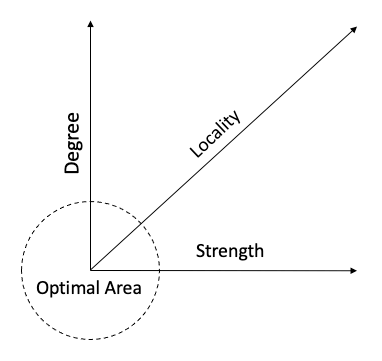Connascence: A metric for coupling
This metric for software quality was invented by Meilir Page-Jones to allow evaluating the degree of coupling between the different actors in an object-oriented design. To do this, it categorizes coupling into different types, serving as an analysis tool to measure the impact of coupling and a guide to reduce it.
To measure the form of connascence there are three factors:
- Strength: When a change in one actor implies a change in another. It will be more serious the more complex and expensive the change is.
- Degree: The occurrence with which the coupling occurs. It will be more serious the more times it is repeated throughout the code.
- Locality: The distance between the actors involved in the coupling. It will be more serious the more distanced the actors are.

Types of Connascence
The types of connascence are divided into dynamic and static, going in severity from strongest to weakest.
Dynamic
- Connascence of Identity (CoI)
- Connascence of Value (CoV)
- Connascence of Timing (CoT)
- Connascence of Execution (CoE)
Static
- Connascence of Algorithm (CoA)
- Connascence of Position (CoP)
- Connascence of Meaning (CoM)
- Connascence of Type (CoT)
- Connascence of Name (CoN)
Dynamic
Connascence of Identity
Multiple elements refer to the same element.
// Both controllers knows about ViewsCounter
class ViewsCounter { ... }
class HomeController {
constructor(private viewsCounter: ViewsCounter) {}
index() {
this.viewsCounter.increment()
...
}
}
class PostController {
constructor(private viewsCounter: ViewsCounter) {}
index() {
this.viewsCounter.increment()
...
}
}Connascence of Value
Multiple values in different elements must change together.
// If PostState changes, so does Post and the test function
enum PostState {
DRAFT = 'DRAFT',
PUBLISHED = 'PUBLISHED'
}
class Post {
private body: string
private state: PostState
private title: string
constructor(title: string) {
this.body = ''
this.state = PostState.DRAFT
this.title = title
}
getState() {
return this.state
}
...
}
test('Post should be created as a draft', () => {
assert(new Post('My first post').getState()).toEqual('DRAFT')
})Connascence of Timing
The timing of execution of multiple elements is important.
// The render function needs the promise to be resolved for rendering the Post list
const getPosts = async (): Promise<Post[]> => {
return posts
}
getPosts().then((posts) => render(posts))Connascence of Execution
The order of execution of multiple elements is important.
// Changing the order of the if clauses in the main function will change its behavior
function isFizz(number: number): boolean { ... }
function isBuzz(number: number): boolean { ... }
function isFizzBuzz(number: number): boolean { ... }
function main(number: number): string {
if (isFizzBuzz(number)) {
return 'FizzBuzz'
}
if (isFizz(number)) {
return 'Fizz'
}
if (isBuzz(number)) {
return 'Buzz'
}
return number.toString()
}Static
Connascence of Algorithm
Multiple elements must agree on a particular algorithm.
// Here the test function knows about the algorithm used for the user's password encription
test('User password should be properly encoded', () => {
const password = 'my_completely_secure_password'
const user = new User(password, 'John Doe')
assert(user.getEncodedPassword()).toEqual(md5(password))
})Connascence of Position
Multiple elements must agree on the order of values.
// Here any consumer of the getUserAddress function have to know the position of each piece of information in order to use it
function getUserAddress(user: User): (string | number)[] {
return [
user.getStreetName(),
user.getStreetNumber(),
user.getPostalCode(),
user.getCity(),
user.getCountry()
]
}Connascence of Meaning
Multiple elements must agree on the meaning of certain values.
// Any consumer of the getRole function needs to know the meaning of its value.
// Does 1 mean Administrator; Customer; Manager; Moderator maybe?
const user = Database.getUserByName('John Doe')
if (user.getRole() === 1) {
...
}Connascence of Type
Multiple elements must agree on the type of an entity (commonly found in weakly or dynamically typed languages).
// Which call will be correct?
function calculateAge(birthYear, birthMonth, birthDay) { ... }
calculateAge(1990, 9, 10)
calculateAge(90, 9, 10)
calculateAge('1990', '9', '10')
calculateAge('1990', 'September', '10')Connascence of Name
Multiple elements must agree on the name of an entity (it’s inevitable).
// Locally changing a property name in one point will break the class.
// Also locally changing a public property or method will break users of Customer class
class Customer {
constructor(private name: string, private familyName: string) {}
fullName() {
return `${this.name} ${this.familyName}`
}
}Reduce coupling
Now that we are able to catalog the degree of coupling at a given point in our system by identifying the type of connascence, we can refactor to a weaker type, thus reducing coupling.
Example: Passing from Connascence of Position to Connascence of Name
Before
function getUserAddress(user: User): (string | number)[] {
return [
user.getStreetName(),
user.getStreetNumber(),
user.getPostalCode(),
user.getCity(),
user.getCountry()
]
}
// Getting the city
const address = getUserAddress(user)
const city = address[3]After
type UserAddress = {
streetName: string
streetNumber: number
postalCode: number
city: string
country: string
}
function getUserAddress(user: User): UserAddress {
return {
streetName: user.getStreetName(),
streetNumber: user.getStreetNumber(),
postalCode: user.getPostalCode(),
city: user.getCity(),
country: user.getCountry()
}
}
// Getting the city
const address = getUserAddress(user)
const city = address.cityExample: Passing from Connascence of Value to Connascence of Name
Before
enum PostState {
DRAFT = 'DRAFT',
PUBLISHED = 'PUBLISHED'
}
class Post {
private body: string
private state: PostState
private title: string
constructor(title: string) {
this.body = ''
this.state = PostState.DRAFT
this.title = title
}
getState() {
return this.state
}
...
}
// Test knows about Post internal implementation
test('Post should be created as a draft', () => {
assert(new Post('My first post').getState()).toEqual('DRAFT')
})After
enum PostState {
DRAFT = 'DRAFT',
PUBLISHED = 'PUBLISHED'
}
class Post {
private body: string
private state: PostState
private title: string
constructor(title: string) {
this.body = ''
this.state = PostState.DRAFT
this.title = title
}
isPublished(): boolean {
return this.state === PostState.PUBLISHED
}
...
}
// Test does not know about Post internal implementation
test('Post should be created as a draft', () => {
assert(new Post('My first post').isPublished()).toBeFalsy()
})Conclusion
Connascence gives us a common metric and vocabulary that can be used by a team to talk about coupling. It will also help us when making decisions about changes to the design, in order to improve it.
Written by Samuel de Vega.